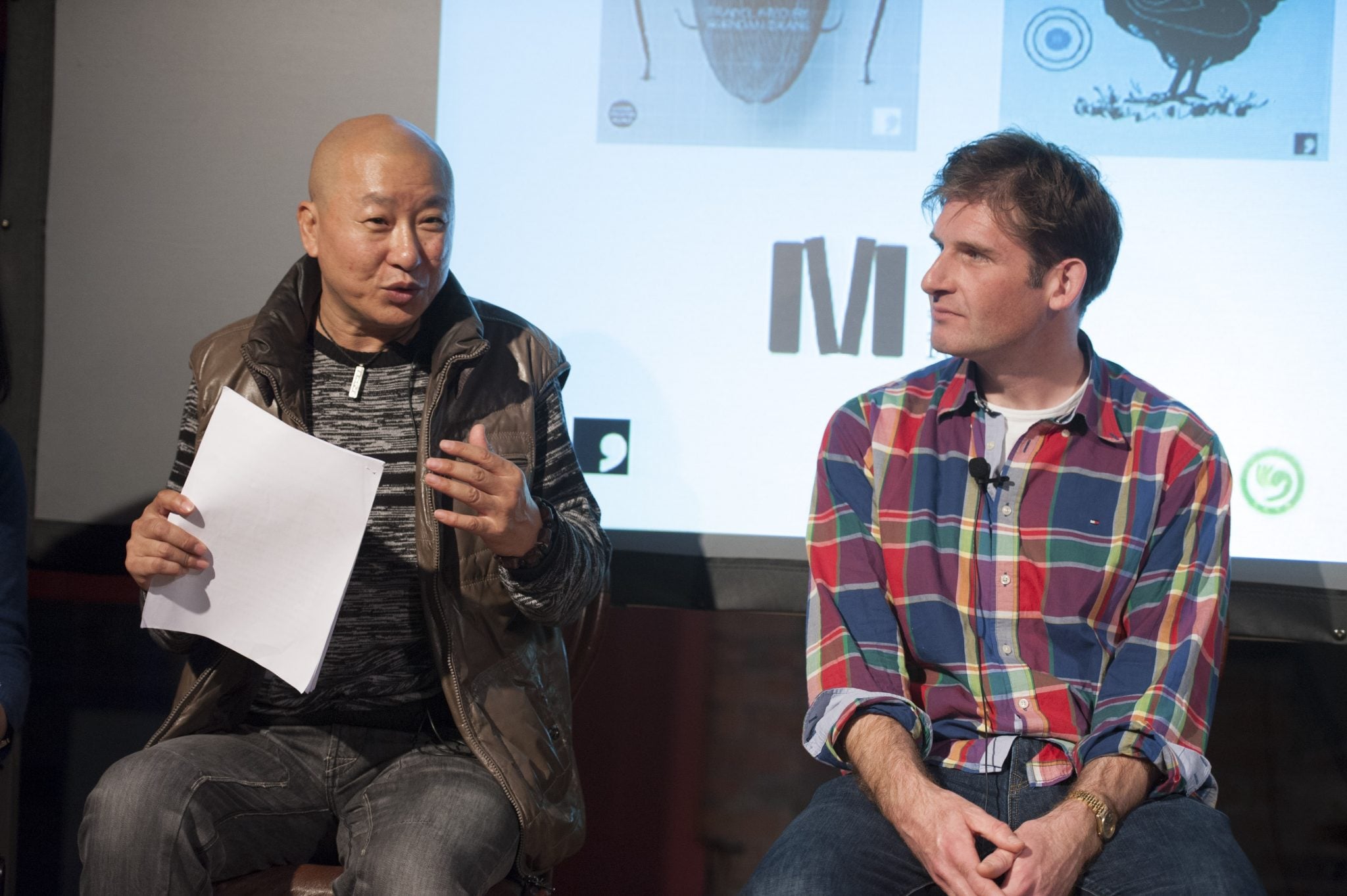Diao Dou & Adam Marek discuss ‘The Modern Surreal’ at the Manchester Literature Festival
December 14, 2015

Ra Page, founder and editorial manager of Comma Press, brings Adam Marek and Diao Dou to Manchester to talk about the dark and eerie worlds of their short stories.
Adam Marek and Diao Dou share a predilection for bringing together the uncanny and the banal to create surrealist tales which are at once chilling, comical, and highly sophisticated. Manchester-based publishing house Comma Press dedicates itself to bringing us authors like these, who otherwise could be lost to commercial pressures seen in mainstream publishing houses. Marek is the author of two short story collections, ‘Instruction Manual for Swallowing’ and ‘The Stone Thrower’, while Dou has written novels, poems and essays as well as his short story collection ‘Points of Origin’.
Page introduces Marek recalling the first story of his he stumbled across. In ‘Testicular Cancer vs the Behemoth’ a man finds out he is terminally ill on the same day that a Godzilla-like monster attacks his city. As Marek reads us the openings from three stories, it becomes clear Marek’s art often begins this way: by positing an odd situation at the very beginning of a story and running with the idea as if it is nothing out of the ordinary. His characters contemplate the fate of HIV-positive ‘Tamagotchi’s, value pets according to their volume (“his cat, a Prussian blue, was huge – five litres, when most cats are three”) and cross-breed with orangutans. When Marek later quotes Roald Dahl as an influence the similarities are clear: his stories are expertly spun and delightfully mad, tapping into the reader’s playful nature.
Dou, as a non-English speaker, reads in animated Chinese. The event organisers went to a great effort to try to bridge the problems posed by the necessity of operating the event in two languages. As Dou reads aloud, non-Chinese speakers can follow the English projected onto a screen on the stage or from printed handouts. Unfortunately as the reading gave way to the interview, the flow of the conversation, perhaps inevitably, becomes disjointed despite the interpreter’s best efforts. As a language student I know how challenging this role can be, but it it was definitely an issue in this event, resulting in many times when Dou’s meaning was unclear and the unfortunate pronunciation of Anthony Burgess as “Anthony Buggers”. This was no doubt compounded by Dou’s charming but tangential and sometimes dead-end anecdotes – although here too it is possible that a lot was lost in translation.
Page opens up the interview with a Kafka quote, “I think we ought to read only the kind of books that wound or stab us. If the book we’re reading doesn’t wake us up with a blow to the head, what are we reading for?” Neither of the authors seems to feel much affiliation with this sentiment and Page seems somewhat deflated by the upbeat nature of the two men, cheery and humble and refusing to play into any kind of tortured artist persona. And the real irony given the continuation of the quote (“So that it will make us happy, as you write?”) is that both authors do attribute huge importance to the joy of writing and reading. Dou regards humour within writing as a way of connecting to and coping with the world, with the potential of bringing joy to the writer and reader: something truly human. Marek too looks to create an experience when writing and reading, describing how he was “truly titillated” by Kafka’s Metamorphosis, and has “been trying to titillate ever since”.
Both authors claim that their use of surrealism is not part of any specific agenda; rather, it is an exploration of the human psyche, art for art’s sake. Marek is fascinated by what goes on in our subconscious minds, what is just bubbling beneath the surface. For him, literature is what allows us to perceive and explore this elusive level of our consciousness. Because of this, each story’s significance is naturally dependent on the interpretation of each reader. Dou’s stories similarly are ambiguous in interpretation, and Page asks for clarification, “Dou, it’s clear your stories are critical – its just not clear what they’re critical of?” Despite being regarding as China’s leading contemporary satirist, Dou holds that it is not his intention to make political commentary. He recognises that politics is everywhere and as such will unavoidably leave some traces of one’s work, but he believes his work harks beyond the political, exploring the dichotomy of civilisation and the wild, human and animal.
The process behind creating off the wall works like these is hard to get your head around. Marek jokes that he has two wheels in his office with images or tropes that fascinate him, he spins them and if they fit together to make a story “money starts pouring out of my mouth”. With regards to how technically surrealism is made palatable, three features stand out: keeping a balance; use of the grotesque; and humour. Limiting the level of surrealism is key, offsetting the uncanny with the banal so the reader keeps one foot in reality. The grotesque and the funny go hand in hand as the authors consciously create an experience which is comforting and unsettling at once. Marek jokes that humour sugarcoats the gruesome and the forbidden, allowing you to talk about anything and knowing that readers will “swallow it, and they will like it!”.
Despite some disruption to the flow of the event, it was nonetheless a pleasure to be read to and hear these authors discuss their artistic processes. Comma Press’s determination to take risks in little-known authors has obviously paid off. My interest is piqued. I for one will keep my ears pricked for all things Comma Press from now on.

Comments